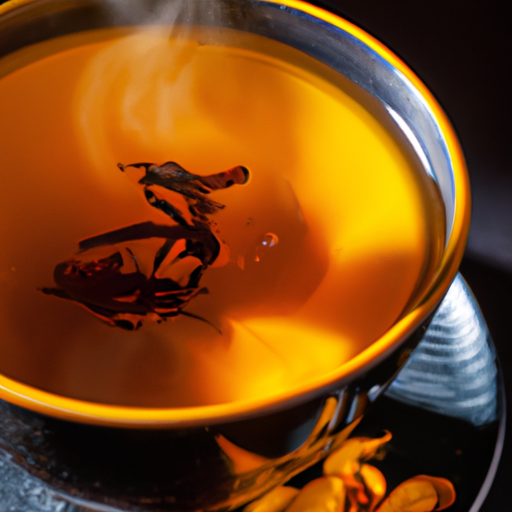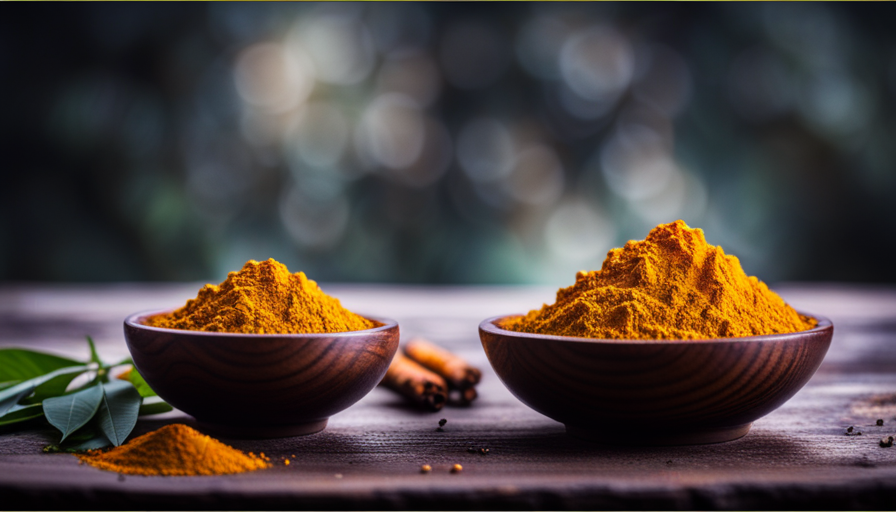You know what they say: ‘An apple a day keeps the doctor away.’ But what about turmeric root tea? This golden elixir has gained popularity for its potential health benefits, from reducing inflammation to boosting immunity. However, like any remedy, it’s important to consider the potential side effects.
So, what are the side effects of turmeric root tea? In this article, we will explore the potential risks and drawbacks of consuming this ancient spice in tea form. From possible allergic reactions to interactions with medications, we will delve into the evidence-based information to provide you with a balanced perspective.
We will also discuss the effects of turmeric root tea on pregnancy and breastfeeding, as well as dosage and safety considerations. So grab a cup of tea and let’s explore the potential side effects of turmeric root tea together.
Key Takeaways
- Allergic reactions, including itching, hives, and difficulty breathing, may occur as a side effect of turmeric root tea.
- Gastrointestinal issues such as stomach upset, nausea, and diarrhea can affect up to 20% of individuals consuming turmeric root tea.
- Turmeric root tea may interact with certain medications, particularly blood thinners and drugs metabolized by the liver.
- Turmeric root tea may increase the risk of bleeding, especially when combined with blood-thinning medications or NSAIDs. This can be particularly concerning for individuals with platelet disorders.
Possible Allergic Reactions
If you’re allergic to turmeric, drinking turmeric root tea may cause itching, hives, or even difficulty breathing. Turmeric contains a compound called curcumin, which can trigger allergic reactions in some individuals. Potential skin irritations include redness, swelling, and a rash. These symptoms generally occur shortly after consuming turmeric root tea and can range from mild to severe.
In rare cases, a severe allergic reaction known as anaphylaxis can occur, leading to difficulty breathing and a drop in blood pressure. It’s important to seek immediate medical attention if you experience these symptoms after consuming turmeric root tea.
Moving on to gastrointestinal issues, turmeric root tea may also cause stomach upset, nausea, or diarrhea. It’s important to listen to your body and discontinue use if you experience any adverse effects.
Gastrointestinal Issues
Gastrointestinal issues can affect up to 20% of individuals who consume turmeric root tea. Some people may experience gastric discomfort or digestive disturbances after drinking this herbal tea. These side effects can include stomach pain, bloating, gas, and diarrhea. The active compound in turmeric, called curcumin, is known to have anti-inflammatory properties, but it can also stimulate the production of gastric acid, which can lead to these gastrointestinal issues.
However, it’s important to note that not everyone will experience these side effects, and they’re generally mild and temporary. If you’re concerned about the potential side effects of turmeric root tea, it’s always a good idea to consult with a healthcare professional.
Moving forward, let’s discuss the potential interactions between turmeric root tea and medications.
Interactions with Medications
When you consume turmeric root tea, it’s important to be aware of how it may interact with medications you’re taking.
Turmeric contains a compound called curcumin, which has been shown to interact with certain drugs. For example, turmeric may increase the effects of blood-thinning medications, such as aspirin or warfarin, which can lead to an increased risk of bleeding. It may also interact with drugs that are metabolized by the liver, potentially affecting their effectiveness.
However, it’s worth noting that more research is needed to fully understand these interactions and their implications. On the other hand, turmeric root tea has been associated with potential health benefits, such as its anti-inflammatory and antioxidant properties.
However, it’s important to discuss any potential interactions with your healthcare provider before adding turmeric root tea to your routine. This will help ensure that you can safely reap its benefits without any adverse effects.
Moving forward, let’s explore another potential side effect of turmeric root tea – an increased risk of bleeding.
Increased Risk of Bleeding
Be cautious and consult your healthcare provider, as turmeric’s interaction with certain medications may increase your risk of bleeding. Here are four important points to consider:
-
Be cautious and consult your healthcare provider, as turmeric’s interaction with certain medications may increase your risk of bleeding. Here are four important points to consider:
-
Blood Thinning Medications: Turmeric root tea may enhance the effects of blood thinners, such as warfarin or aspirin, leading to an increased risk of bleeding. It’s crucial to monitor your blood clotting levels regularly.
-
Non-Steroidal Anti-Inflammatory Drugs (NSAIDs): Combining turmeric with NSAIDs like ibuprofen or naproxen can further thin the blood and heighten the chance of bleeding. Be aware of potential bruising or prolonged bleeding.
-
Platelet Disorders: If you have a platelet disorder, turmeric root tea may exacerbate the issue by interfering with platelet function. This can result in excessive bleeding.
-
Allergic Reactions: Although rare, some individuals may experience allergic reactions to turmeric. These allergic responses can include hives, itching, or difficulty breathing. Seek immediate medical attention if you experience any of these symptoms.
Considering these risks, it’s important to be aware of the potential for increased bleeding risk and allergic reactions when consuming turmeric root tea. Moving on to the subsequent section, let’s discuss the staining of teeth and skin.
Staining of Teeth and Skin
To avoid potential staining, you’ll want to be cautious when consuming turmeric root tea as it can leave a lasting mark on your teeth and skin. Turmeric contains a compound called curcumin, which is known for its vibrant yellow color. This pigment can easily bind to tooth enamel, leading to tooth discoloration over time. Additionally, if the tea comes into contact with your skin, it may cause temporary skin discoloration. To illustrate the potential effects of turmeric root tea on teeth and skin, refer to the table below:
| Effect | Teeth | Skin |
|---|---|---|
| Discoloration | Yellowing or staining | Temporary yellow/orange hue |
While these effects are generally harmless and can be reversed with proper dental hygiene and skin care, it’s important to be aware of them. Now, let’s explore the effects of turmeric root tea on pregnancy and breastfeeding.
Effects on Pregnancy and Breastfeeding
Moving on from the potential staining of teeth and skin, it’s important to consider the effects of turmeric root tea on pregnancy and breastfeeding.
As a woman who’s currently pregnant or breastfeeding, you may be wondering if it’s safe to consume this herbal tea. While turmeric root tea is generally considered safe in small amounts, it’s recommended to consult with your healthcare provider before incorporating it into your routine.
Some studies suggest that turmeric may have an effect on fertility and could potentially interfere with pregnancy. Additionally, there’s limited research on the impact of turmeric on breast milk production. Therefore, it’s crucial to discuss any concerns or questions you may have with your healthcare provider.
Now, let’s delve into the dosage and safety considerations of turmeric root tea.
Dosage and Safety Considerations
As you tread the path of incorporating turmeric root tea into your routine, take a sip of caution and navigate the realm of dosage and safety considerations. When it comes to turmeric root tea, it’s important to follow dosage guidelines to ensure you experience its benefits without any negative effects. The recommended dosage of turmeric root tea is generally 1-1.5 grams per day. However, it’s always best to consult with a healthcare professional to determine the right dosage for your specific needs. Additionally, it’s important to be aware of potential drug interactions. Turmeric root tea may interact with certain medications, such as blood thinners and diabetes medications. It’s crucial to discuss any potential interactions with your healthcare provider before incorporating turmeric root tea into your routine. To help you visualize the importance of proper dosage and potential drug interactions, here is a table summarizing the key points:
| Dosage Guidelines | Potential Drug Interactions | Importance of Caution |
|---|---|---|
| Follow recommended dosage guidelines | Discuss potential interactions with healthcare provider | Ensure safety and effectiveness |
| 1-1.5 grams per day | May interact with blood thinners and diabetes medications | Avoid adverse effects |
| Consult healthcare professional for personalized dosage | Understand potential risks and benefits | Optimize health outcomes |
Frequently Asked Questions
Can turmeric root tea help with weight loss?
Yes, turmeric root tea can potentially help with weight loss. Studies suggest it may boost metabolism and aid in appetite control. However, it’s important to note that individual results may vary and it should be used as part of a balanced lifestyle.
Can drinking turmeric root tea improve skin health?
Drinking turmeric root tea may improve skin health by potentially treating acne and promoting hair health. However, it’s important to consider potential side effects of turmeric root tea before incorporating it into your routine.
Is it safe to consume turmeric root tea while on blood-thinning medications?
Drinking turmeric root tea while on blood-thinning medications may increase the risk of bleeding. It’s important to consult with a healthcare professional to understand potential interactions between turmeric root tea and your medication.
Can turmeric root tea be used to treat digestive disorders like acid reflux or irritable bowel syndrome?
Turmeric root tea has been used to alleviate symptoms of acid reflux and irritable bowel syndrome. Some studies suggest it may have anti-inflammatory properties that could help with these digestive disorders.
Are there any known drug interactions between turmeric root tea and antidepressant medications?
Are there any known drug interactions between turmeric root tea and antidepressant medications? It is important to be cautious when combining the two, as turmeric may enhance the effects of certain antidepressants. Discuss with your healthcare provider for personalized advice on dosage and effectiveness.
Conclusion
In conclusion, turmeric root tea may have some potential side effects that should be considered. It’s important to be aware of possible allergic reactions, gastrointestinal issues, and interactions with medications.
Additionally, there’s an increased risk of bleeding and the potential for staining of teeth and skin. Pregnant and breastfeeding individuals should exercise caution, as the effects on these conditions aren’t fully understood.
It’s always recommended to consult with a healthcare professional and follow dosage and safety guidelines for optimal use.










